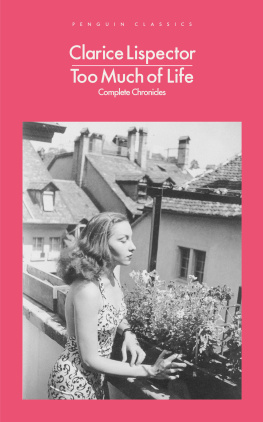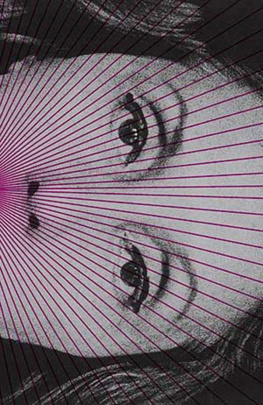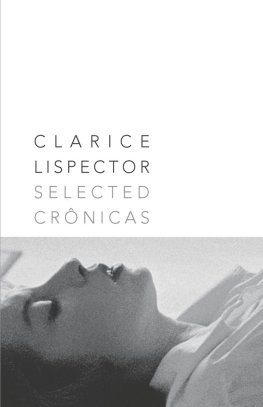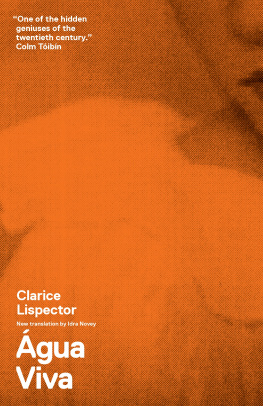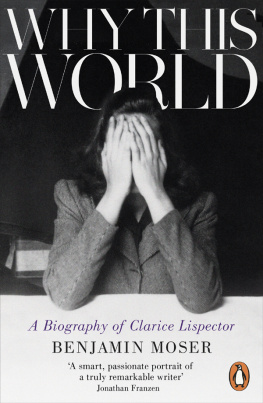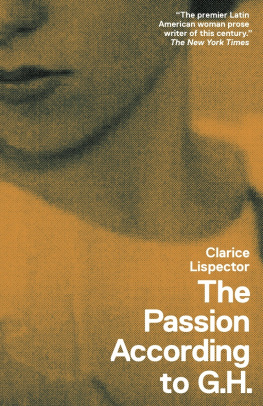Clarice Lispector - Near to the Wild Heart: A Novel
Here you can read online Clarice Lispector - Near to the Wild Heart: A Novel full text of the book (entire story) in english for free. Download pdf and epub, get meaning, cover and reviews about this ebook. year: 1990, publisher: New Directions, genre: Science fiction. Description of the work, (preface) as well as reviews are available. Best literature library LitArk.com created for fans of good reading and offers a wide selection of genres:
Romance novel
Science fiction
Adventure
Detective
Science
History
Home and family
Prose
Art
Politics
Computer
Non-fiction
Religion
Business
Children
Humor
Choose a favorite category and find really read worthwhile books. Enjoy immersion in the world of imagination, feel the emotions of the characters or learn something new for yourself, make an fascinating discovery.

- Book:Near to the Wild Heart: A Novel
- Author:
- Publisher:New Directions
- Genre:
- Year:1990
- Rating:5 / 5
- Favourites:Add to favourites
- Your mark:
- 100
- 1
- 2
- 3
- 4
- 5
Near to the Wild Heart: A Novel: summary, description and annotation
We offer to read an annotation, description, summary or preface (depends on what the author of the book "Near to the Wild Heart: A Novel" wrote himself). If you haven't found the necessary information about the book — write in the comments, we will try to find it.
Near to the Wild Heart: A Novel — read online for free the complete book (whole text) full work
Below is the text of the book, divided by pages. System saving the place of the last page read, allows you to conveniently read the book "Near to the Wild Heart: A Novel" online for free, without having to search again every time where you left off. Put a bookmark, and you can go to the page where you finished reading at any time.
Font size:
Interval:
Bookmark:
NEAR TO THE WILD HEART
CLARICE LISPECTOR
TRANSLATED WITH AN AFTERWORD BY GIOVANNI PONTIERO
A NEW DIRECTIONS BOOK
Copyright Editora Nova Fronteira, 1986 Copyright 1990 by Giovanni Pontiero
This translation of Clarice Lispector's Perto do coraqao selvagem (1944) is published by arrangement with Carcanet Press Limited, Manchester, England.
First published clothbound and as New Directions paperbook 698 in 1990
Library of Congress Cataloging-in-Publication Data
Lispector, Clarice. [Perto do coracao selvagem. English] Near to the wild heart /
Clarice Lispector: translated with an afterword by Giovanni Pontiero. p. cm.
Translation of: Perto do coracao selvagem.
ISBN 978-0-8112 I140-6 (acid-free) I. Title. PQ9697.L585P413 1990 869.3-dc20 90-33455 CIP
Contents
Acknowledgements
I should like to express my gratitude to Michael Schmidt and the editorial staff of Carcanet Press; to the National Book Institute and VITAE Foundation in Brazil for their financial support; to Maria Fernanda Romao and Stefanie Goodfellow whose assistance proved to be invaluable; and finally to Juan Carlos Sager, Nancy Stalhammar, Gordon Kinder, Paul Berman and Neil Ferguson who kindly read the manuscript and offered many useful suggestions towards improving earlier drafts of the translation.
GIOVANNI PONTIERO
Manchester, March 1989
... One Day...
He was alone. He was unheeded, happy and near to the wild heart of life.
-James Joyce
A Portrait of the Artist
as a Young Man
Part One
The Father...
Daddy's typewriter was tapping out tac-tac..tac-tac-tac... The clock chimed brightly ting-ting... ting-ting... The silence dragged out zzzzzzz. The wardrobe was saying what? clothes clothes clothes. No, no. Between the clock, the typewriter and the silence there was an ear listening out, large, flesh-pink and dead. The three sounds were connected by the light of day and by the rustling of tiny leaves on the tree as they joyfully rubbed against each other.
Resting her head against the cold, shiny window-pane, she looked into the neighbour's yard, at the great world of the chickens-that-did-not-know-they-were-about-to-die. And as if it were right under her nose, she could smell the warm, beaten earth, so fragrant and dry, where she knew perfectly well, she knew perfectly well that some worm or other lay squirming before being devoured by the hen that humans were going to eat.
There was a grand moment, motionless and quite hollow inside. She opened her eyes wide and waited. Nothing happened. Blank. But suddenly with a shudder they wound up the day and they began to function once again, the typewriter tapping, father's cigarette giving off smoke, silence, tiny leaves, plucked chickens, brightness, things restored to life and as impatient as a kettle on the boil. All that was missing was the ting-ting of the clock which gave so much pleasure. She closed her eyes, pretended to hear it chime, and to the rhythm of that imaginary music, she went up on the tips of her toes. She executed three dance steps, so light and ethereal.
Then suddenly she looked at everything with displeasure, as if she had eaten far too much of that concoction. 'Hey, hey, hey...', she murmured wearily and then thought to herself: what will happen now now now? And in the fraction of time that followed, nothing ever happened if she went on waiting for something to happen if you get my meaning? She pushed away this awkward thought, distracting herself with a movement of her bare foot on the dusty wooden floor. She rubbed her foot, looking sideways at her father, awaiting his impatient and nervous smile. But nothing happened. Nothing. It's difficult to suck in people like the vacuum cleaner does.
Daddy, I've invented a poem.
What is it called?
The sun and I Then almost at once she recited: 'The chickens in the yard have gobbled two worms but I didn't see them.'
Really? What do you and the sun have to do with poetry?
She looked at him for an instant. He had not understood ...
The sun is above my worms, Daddy, and I wrote my poem and didn't see the worms... Pause. I can make up another poem this very minute: 'Oh sun, come play with me.' Here's a longer one:
'I saw a tiny cloud
poor little worm
I don't think she saw it.'
Those are pretty verses, my little one, very pretty. How does one compose such a charming poem?
It isn't difficult, you simply say it out loud.
She had already dressed her doll, she had already undressed it, she had imagined it going to a party where it stood out among all the other baby dolls. A blue car ran over Arlete's body and killed her. Then the fairy appeared and her doll was restored to life. The baby doll, the fairy, the blue car were none other than Joana, otherwise the game would be rather dull. She always found some means of casting herself in the main role as some turn of events highlighted one or other of the characters. She took the game seriously, working in silence, her arms hanging at her sides. She didn't need to get close to Arlete in order to play with her. Even from a distance she possessed things.
She amused herself with the paper cut-outs. She looked at them for a moment and each cut-out was a pupil. Joana was the teacher. The one good, the other bad. Yes, yes, and so what? And now now now? And nothing ever happened if she... that's right.
She invented a little man the size of her index finger, with long trousers and a bow tie. She carried him in the pocket of her school uniform. The little man was a real gem, a diamond in a cravat, he had a deep voice and would say from inside her pocket: 'Your Royal Highness Joana, pray lend me your ear for one moment. I beseech you to interrupt your constant labours just for one moment?' And then he declared: 'I am at your service, dear Princess. Whatever you command I am prepared to do.'
Daddy, what can I do?
Go and read your books.
I've read them.
Go and play then.
I have been playing.
Then don't bother me.
She twirled round and came to a halt, watching without curiosity the walls and ceiling as they went round and fell apart. She walked on tiptoe, only treading on the dark floorboards. She closed her eyes and moved forward, her hands outstretched, until she bumped into some piece of furniture. Between her and the objects there was something, but when she caught that thing in her hand like a fly and then looked however much care she took not to let anything escape -all she found was her own hand, rosy and disheartened. Yes, I know it was air, I know it was air! But that didn't help, that didn't explain anything. This was one of her secrets. She would never permit herself to confide, even to daddy, that she was unable to catch 'the thing'. Everything that really mattered was precisely what she found herself unable to confide. She only talked nonsense to people. When she told Ruth, for example, some of her secrets, she became furious with Ruth. The best thing was surely to keep one's mouth shut. Another thing: if she felt some pain and she looked at the hands of the clock while that pain was troubling her, she would then notice that the minutes counted on the clock were passing while the pain went on hurting. Or else, even when it didn't hurt her in the slightest, if she stood in front of the clock staring at it, what she was not feeling was also greater than the minutes counted on the clock. Now, when she experienced some happiness or rage, she would run to the clock and observe the seconds in vain.
She went to the window, traced a cross on the window-sill and spat out in a straight line. If she were to spit once more now she would have to wait until night-time the disaster could be avoided and God would be so good to her, but so good that... that what?
Daddy, what can I do?
Next pageFont size:
Interval:
Bookmark:
Similar books «Near to the Wild Heart: A Novel»
Look at similar books to Near to the Wild Heart: A Novel. We have selected literature similar in name and meaning in the hope of providing readers with more options to find new, interesting, not yet read works.
Discussion, reviews of the book Near to the Wild Heart: A Novel and just readers' own opinions. Leave your comments, write what you think about the work, its meaning or the main characters. Specify what exactly you liked and what you didn't like, and why you think so.

